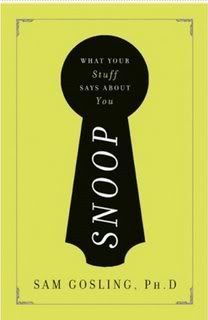[I'm a phony and I love it!]
Salon has an extremely interesting and relevant interview with NYU philosophy professor Thomas De Zengotita, who just published a book about media, mediation, and its effects on our beloved post-modern Western culture. Basically, De Zengotita argues that human behavior, in a culture overflowing with tediously flattering media representations and endless choices about what kind of person you want to be, tends to be little more than method acting, but also tinged with the demand, always, to be oneself. The result, he says, is that we are all mediated -- not exactly phonies, but experts at expressing our authenticity in a precisely performative way. And while he admits to being curmudgeonly and initially wanting to throw a blanket of condemnation on aforementioned brand of existence, he found through his 30 years of research that this existence isn't all bad and it's incredibly lucky when compared to other ways of existing. I mean, there are worse things in life to be than mediated. You know, on crack or impoverished (well, I guess being on crack would qualify as being mediated, but you know what I mean).
Anyway, an excerpt from the interview:
"The core original thought in the book is this idea of representations being inherently flattering. Everyone knows that ads seek to flatter you, but as far as I know, no one has noted the significance of just being addressed, period. I mean this in the sense that an evolutionary psychologist might think of it: You're wired to respond when someone addresses you. Someone says hello, makes a token gesture, acknowledges your existence, and you respond. In this mediated environment, you're incessantly addressed in flattering ways just by virtue of the fact that you are surrounded by these representations. But it's in the nature of flattery to fail to satisfy you.
"That's where the motivation for what I call the virtual revolution comes from. As the technology became available, and even before, a class of spectators began to claim the status of celebrity. They felt entitled to it because they've been flattered so much. I think this idea is synthetic: It pulls together phenomena all the way from the popularity of memoirs and autobiographies of ordinary people, from reality TV to blogs, to taking pictures of your life on your cellphone. On and on."
Anyway, it's called Mediated: The Hidden Effects of Media on People, Places, and Things, and thanks to my thoroughly post-modern, mediated access to Amazon, it'll be in the mail tomorrow and hopefully on my doorstep by the end of next week. Rock.
Salon has an extremely interesting and relevant interview with NYU philosophy professor Thomas De Zengotita, who just published a book about media, mediation, and its effects on our beloved post-modern Western culture. Basically, De Zengotita argues that human behavior, in a culture overflowing with tediously flattering media representations and endless choices about what kind of person you want to be, tends to be little more than method acting, but also tinged with the demand, always, to be oneself. The result, he says, is that we are all mediated -- not exactly phonies, but experts at expressing our authenticity in a precisely performative way. And while he admits to being curmudgeonly and initially wanting to throw a blanket of condemnation on aforementioned brand of existence, he found through his 30 years of research that this existence isn't all bad and it's incredibly lucky when compared to other ways of existing. I mean, there are worse things in life to be than mediated. You know, on crack or impoverished (well, I guess being on crack would qualify as being mediated, but you know what I mean).
Anyway, an excerpt from the interview:
"The core original thought in the book is this idea of representations being inherently flattering. Everyone knows that ads seek to flatter you, but as far as I know, no one has noted the significance of just being addressed, period. I mean this in the sense that an evolutionary psychologist might think of it: You're wired to respond when someone addresses you. Someone says hello, makes a token gesture, acknowledges your existence, and you respond. In this mediated environment, you're incessantly addressed in flattering ways just by virtue of the fact that you are surrounded by these representations. But it's in the nature of flattery to fail to satisfy you.
"That's where the motivation for what I call the virtual revolution comes from. As the technology became available, and even before, a class of spectators began to claim the status of celebrity. They felt entitled to it because they've been flattered so much. I think this idea is synthetic: It pulls together phenomena all the way from the popularity of memoirs and autobiographies of ordinary people, from reality TV to blogs, to taking pictures of your life on your cellphone. On and on."
Anyway, it's called Mediated: The Hidden Effects of Media on People, Places, and Things, and thanks to my thoroughly post-modern, mediated access to Amazon, it'll be in the mail tomorrow and hopefully on my doorstep by the end of next week. Rock.




















0 Comments:
Post a Comment
<< Home